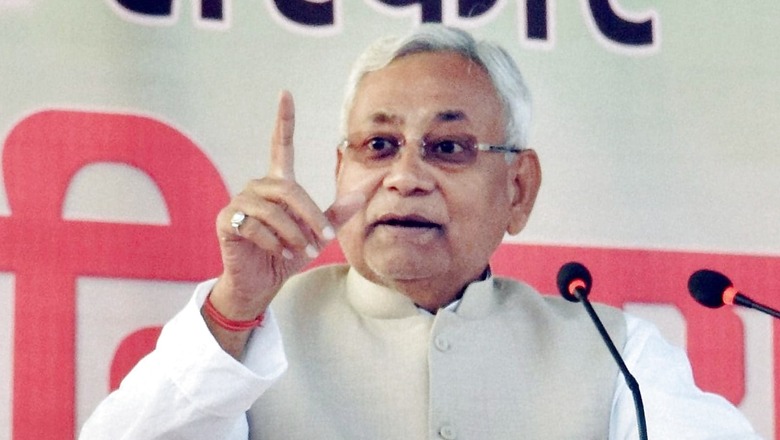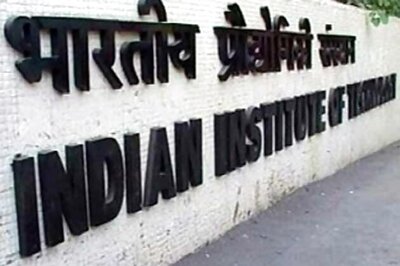
views
It is said that Nitish Kumar has a record of being sworn in eight times as the chief minister of Bihar. And that he has once resigned as a chief minister with the express purpose of being sworn in again as the chief minister. But these are tit-bits.
The first substantive elections he won to authentically claim to be the chief minister was in 2005, when the alliance of his party and the BJP won a resounding victory over the Rashtriya Janata Dal (RJD), which is a family party of Lalu Prasad Yadav. This victory came on the heels (sort of) of a long rule by Yadav and his family, the main characteristic of which was corruption and goondagiri. The former was showcased by the fodder scam, for which Yadav had to spend time in jail, which made him ineligible to contest elections.
One of the more notorious examples of goondagiri was when the RJD party goons went to various car dealerships in Patna and sequestered new cars on the occasion of the wedding of one of the daughters of Yadav. There was little uproar about this act of vandalism — the ‘secular’ media buried the story, and the business community was conspicuous by its silence.
When Kumar became the chief minister, he immediately set out to deal with the law-and-order situation by putting behind bars thousands of anti-social elements, many from his own party. It had an immediate effect throughout the state. The stalled infrastructure projects came to life, and doctors could keep their clinic open till 8 pm or longer, instead of having to close at 5 pm and reach home safely before sunset. The rate of increase in GDP was in double digits in percentage terms and the state became a star performer in India.
In 2010 elections, the election theme of Kumar was: “Forward caste, backward caste, Dalit, Mahadalit, women, men, in every person there is a confidence that we will all remain united, and take Bihar forward. This is not a trivial change.”
The media noticed the effect of the theme, and Sagarika Ghose commented: “Nitish Kumar is not the stereotypical Bihari politician… This is a litmus test. If Nitish Kumar wins this election, the old-style jati-ki-rajniti (caste politics) has ended forever… He tells them not to vote on the basis of caste, but to vote for a united Bihar.”
And Kumar, again in alliance with the BJP, gave another sterling performance at the hustings. This was after a disappointing performance of the BJP in the 2009 general election.
One would have thought that the so-called intellectual class would be happy about the social change that took place under Kumar. He did not go about doing what is called social engineering — he went about giving good governance, where the needs of the people were uppermost in his mind. In 2006, in another context, Andre Betellie, a respected sociologist, wrote: “The prevalent view among educated Indians in the early years of Independence was that caste was in decline: it had its importance in India’s past but it would have little importance in its future.” However, the ‘intellectual’ class soon went away from this position and were actually wanting to divide the society using caste as a marker.
Soon after the 2010 Bihar elections, the shenanigans of the Congress-led UPA government at the Centre were coming to the fore. Allegations of scams in various sectors were coming to the fore, and the economy was sliding down on various parameters. However imperfectly, a middle class was growing, which saw that its aspirations were not going to be easily fulfilled. And the hope of this middle class rested with Narendra Modi, whose performance as Gujarat chief minister reinforced this hope. This too was not liked by those who saw that caste division was going to play a less important role in the future in the society, particularly at the time of the elections.
The strategy was to see how Kumar’s mind can be turned against the BJP by trying to demonise Narendra Modi in all sorts of ways. Additionally, Kumar was told that given his own electoral performance of 2010, he too has a legitimate chance to be considered as a national leader. And, Kumar was supposed to have an added advantage because of being secular (which in the ‘intellectual’ parlance meant Muslim appeasement).
Aside from the political colleagues of Kumar within his own party, two people took it upon themselves to steer Kumar away from the BJP because of the rise of Modi to national prominence. They were Pavan K Varma who was the cultural secretary of Kumar, and NK Singh who held various positions in the government before becoming a Rajya Sabha member of the Janata Dal (United). An event that led to the change in Kumar’s thinking was a dinner that Singh hosted in Cambridge University, United Kingdom, around 13 June 2013. The groundwork of creating a false narrative of anti-Modism had already been started by the Khan Market Gang because they were as mortally afraid of Modi coming to power in the 2014 Lok Sabha elections as the non-BJP parties.
At this event, Prof Amartya Sen was present. Singh asked Sen what should Kumar do in the situation. Sen said: “Well, Nitish Kumar has several options, but only one honourable one.” Given his own political predilection, Sen’s message was very clear, and Singh drafted the resolution to disassociate with the BJP. Kumar formed a government with RJD.
Soon the 2014 Lok Sabha elections took place. Kumar contested the elections in alliance with the RJD and some other parties. The BJP had an alliance with the Lok Janashakti Party of the late Ram Vilas Paswan and some others. The BJP alliance won 31 seats out of 40, with the BJP winning 22. Kumar’s alliance had to settle for the rest, out of which his own party won only two. And, despite the best efforts of the Khan Market Gang, the BJP secured a majority of its own, and a comfortable majority with its electoral partners in the Lok Sabha.
Kumar accepted responsibility for the bad performance in Bihar and resigned. He installed his then loyalist, Jitan Ram Manjhi, as the CM but dislodged Manjhi and returned to the CM’s chair in February 2015. And the Assembly elections of 2015 was held in alliance with the RJD, Congress, the communists, etc, which was named as Mahagathbandhan. The election was won by Kumar’s alliance with a handsome majority.
Lalu Prasad Yadav’s son was now the head of the RJD, and the son wanted to be the chief minister instead of the deputy. Not only that, the old goondaism and corruption of the RJD was once again being displayed. Kumar was forced to end the alliance because it was reflecting poorly on his own image and he thought that this would adversely affect his national ambitions. In 2017, he ended the alliance with the RJD and formed a government with the BJP. Again a period of good governance started. Additionally, the Central government had some aggressive infrastructure programmes which benefited all states, including Bihar.
The 2020 Bihar Assembly election was tough for Kumar and the BJP. Kumar’s governance was not as stellar as in his 2005 term. For various reasons, the number of seats that the RJD won came down drastically. It was the BJP’s performance that enabled the alliance to cross the majority required. However, the BJP had announced during the campaign that Kumar would be chief minister irrespective of who got more seats.
Kumar alleged that the BJP was the reason for his poor performance, and that the saffron party would be continuously working to marginalise him. For some reason he continues to have national ambition. So, beginning August 2022, Kumar resigned as chief minister to become chief minister again — this time with his regional rival, RJD.
Various analysts, particularly from the Khan Market Gang, projected the events as gains or losses for which political party and which individual. The consensus amongst them was that the losers were the BJP and Modi. And that this might affect the prospects of Modi (and hence the BJP) in the 2024 elections. Kumar has encouraged this thinking when he said that those who won in 2014 will not come back in 2024.
But what about the people of Bihar? The evidence is very clear that the governance of the RJD has been poor, and that Kumar in alliance with the RJD has not been able to provide good governance either. However, when in alliance with the BJP, the governance factor was good — may not be as good as desired, but certainly better than in an alliance with the RJD. In all the shenanigans, the political analysts seem to have forgotten the people, and are happy only because the election prospects of the BJP will be hampered.
It is not due to anything inherent in the state and its people that Bihar is a poor state within India. It should be remembered that the Magadh empire was large and prosperous with Pataliputra (present-day Patna) as its capital. Post-Independence, for a long time, the elected rulers gave very little attention to governance, and contested elections on basis of dividing the Hindus on caste basis, and appease the Muslim thekedars to marshal the Muslim votes. When he was given an opportunity in 2005, Kumar showed what governance can do. And then in 2010, he made a successful attempt to show that Hindus can set aside caste as a marker for elections.
As I have shown earlier, it is the so-called intellectual class that authenticated the divisive electoral strategy. While they themselves were not adversely affected in monetary terms, it is the people at large who have suffered. Those without having state patronage would always seek to migrate out of the state for better living.
Kumar has risen up in public service with the idealistic ideas of Ram Manohar Lohia and Jayaprakash Narayan. So also Lalu Prasad Yadav and Mulayam Singh Yadav. However, the corrupting influence of electoral politics made them shed this idealism, and fall in trap of the narrative set by those who claim to be educated and flaunt the term ‘idea of India’ without really spelling out what it actually is. It is they who have destroyed the Nitish Kumar of 2005 for their own agenda. The Kumar of 2020 cannot even dream of being an authentic national alternative to Modi, because he has clearly shown that his objective is himself and not the people of Bihar, let alone India.
Ashok Chowgule is the vice-president of Vishwa Hindu Parishad. Views expressed are personal
Read the Latest News and Breaking News here




















Comments
0 comment